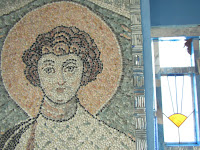I'm (temporarily) back in Sydney - home from Ubud, about to leave for South Africa - but before my head fills with new things, I wanted to write about the place in Bali that will linger longest for me: Michi Retreat.
 |
| Gate to "the way" |
Michi's backstory, briefly: a complex of villas and rooms, it was built beside the rushing Wos river (and about 15 minutes south of Ubud by scooter) more than a decade ago as a place for creatives to gather, swap ideas, relax and make art.
In true "retreat" style, it has a meditation pagoda over a lotus pond, a yoga studio, a spa (and salon, complete with beehive-hairdryers) and Buddhist and Hindu sculptures all over the grounds. Its name even means "the way" in Japanese.
In true "retreat" style, it has a meditation pagoda over a lotus pond, a yoga studio, a spa (and salon, complete with beehive-hairdryers) and Buddhist and Hindu sculptures all over the grounds. Its name even means "the way" in Japanese.
 |
| Mermaid by the sparkling pool |
These days Michi is run as a hotel (it's on Airbnb, Tripadvisor, Agoda and Wotif), albeit one that draws seekers of all persuasions and is a work of art in itself - with everything from fruit painted on walls and mermaids by the pool, to Gaudi-esque sculptures and praying-frog statues.
It's definitely one of the most unusual places I've stayed - and one of the most well-travelled, thanks to Michi's reclusive owner, a retired professor originally from Manchuria who has lived everywhere from Kathmandu to Krakow, and now writes history books (his latest is about America in the early 20th century) in Japanese.
 |
| My Turkey room |
For two weeks, I stayed in the bamboo-walled Japan-room called Hotaru, which means "firefly" in Japanese, before moving next door to Turkey (a light-filled, mosaic-mirrored room called Anadolu) for another two weeks.
There are rooms called Mekong, Feng Shui, Only Yesterday (reminiscent of Paris in the 1920s). There's a Zen villa with shoji walls. A Rajasthani room called Merra. A blue-walled Mediterranean room with Grecian mosaics.
One of the reasons I felt so at home at Michi was its refreshing and very un-hotel-like lack of rules.
You won't find a compendium in your room explaining which number to call for housekeeping or what time you can have breakfast. Or any signs saying when you can use the pool. You can wander wherever you like (peeking in unoccupied rooms, their doors wide open for airing). There are no daily yoga classes or activities.
 |
| My daily breakfast table |
Michi's restaurant too is more like a common room, a place to sit at the mosaic-topped tables and read, work, chat to fellow guests about matters of the spirit, mind and body (this being Ubud) or gaze at the parallel lines of the rice fields across the river.
And there can't be many hotels that have a resident professor. He rarely sleeps, and welcomes guests to his attic-like apartment between 9pm and 11pm any night of the week.
 |
| The prof |
I listened to him, rapt, for almost three hours, as he told me stories from his unwritten memoir. About Istanbul, where he taught and stayed in a hotel a few doors up from Agatha Christie, who was writing Murder on the Orient Express at the time. About living in a hotel in Kyoto for 20 years (“Why not? Clean sheets, restaurants, two bars, no need to cook!” he said). About honeymooning with his second wife on a cargo ship as it crossed the Pacific from Japan to San Francisco.
He's 83 this year but feels “about 60” and says he'd like to have “one last love affair” before he steps into the void. One night I saw him dining in Michi's restaurant with a 20-something Russian guest; when he came over to my table to give me a glass of Argentinian wine, ever the generous host, he whispered to me, "Her father used to work for the KGB!"
 |
| Michi's kindly staff |
It's not all rainbows and lollipops. Every new guest seems to have the same double-barrelled first impression: wow, this place is incredible and boy, is it run-down. The rooms are kept clean, tidy and lovely. But the place is so detailed - every surface, indoors and out, has been painted, mosaic-ed or inlaid with stones, marble or mirrors - it needs regular upkeep, which it hasn't been getting lately.
 |
| Mosaic in the Mediterranean room |
But Michi’s star is rising, it seems, as it attracts more people who catch its spirit and want to help restore it to a new glory. There's talk of a new manager, creative work-parties to spruce the place up a bit, long-term rentals for artists.
I loved staying at Michi - for the simplicity and sense of freedom I felt there. For the professor's presence, working in his bookish nest every day and night, inspiring me to write. For how it arouses wonder and curiosity in everyone who comes down its driveway, and reminds us of the things that matter more than material perfection.
Leaving Michi was like leaving home all over again. The professor gave me a present (a book of Tagore's poems) and the staff stood in the driveway to wave me goodbye. May it brush off the cobwebs soon and become one of Ubud's quietly shining stars.







